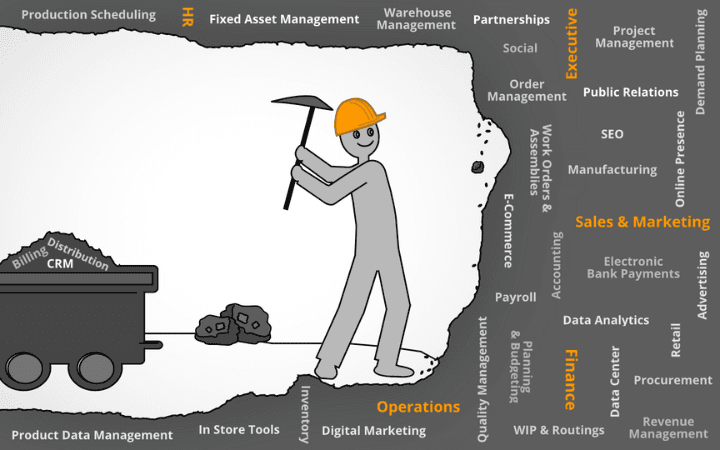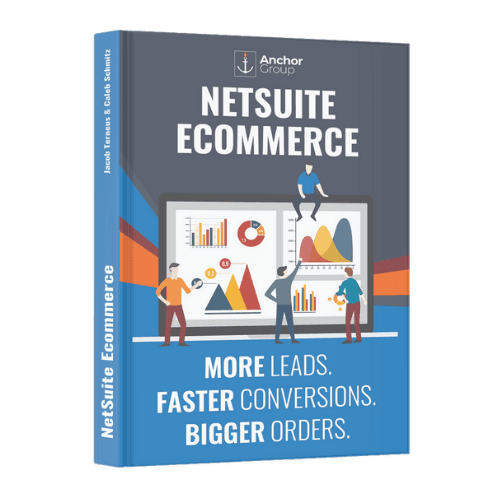Clearly defining what you want your website customer experience to be, as well as how your website will interact with the NetSuite backend, is by far the most important part of any SuiteCommerce implementation. Without clear requirements, you are throwing a line out at random and just hoping that the fish you land will be the kind of fish you want to catch.
So, how do you gather requirements well? What makes for a rock-solid set of website requirements? It begins with a thorough self-interrogation.
Asking the Right Questions
Your company needs to ask itself what it really wants out of this website:
- What are the essential functions of the business that must be transferred from the previous website or sales process?
- What are the areas of the business that would most benefit from automation?
- What do your customers wish you could change?
I like to think of this self-interrogation or requirements gathering as an act of mining. That is, you are mining your current business, delving deep into how you do things – these are the tunnels that you have dug before, with which now you are just re-familiarizing yourself in order to communicate the structure of those tunnels to your SuiteCommerce implementation team. However, when you reach the end of each old mine tunnel, you will still have to dig a bit further.

Beyond outlining existing business processes, you also need to plot out a course for where the tunnels will go next... where you hope your company can become more efficient and effective through its new ecommerce site. Essentially, you are drawing a tunnel map of your business processes to guide implementation.

What follows are suggestions for gathering requirements, along with sample questions to help you ask the right questions of your company. You do not have to collect requirements completely by yourself, of course; a decent SuiteCommerce consultant will be able to guide you along this process of requirement discovery. However, in the end, you cannot rely on an external consultant to know what your company needs. Defining requirements is ultimately your job.
Rather than starting with what NetSuite offers natively, you may find it more fruitful to first sit down and think about your business's day-to-day needs.
“native” = something that NetSuite comes with by default. Generally, this is not something custom or based on custom code.
Having a clearly defined list of requirements will help you and your NetSuite implementation team understand exactly what you want from NetSuite. Here are some questions to get you started...
Recommended Approach & Basic Company Questions
Before you dig too deep into any one aspect of your company, start with the basics. Think of it as beginning with the 30,000-foot view. Only after you've sketched out the essential framework of what it is your company does can you start to dive deeper into particular aspects of your business.
- What does your company sell? Products, services, or both?
- Are your products simple or complex? That is, do you sell roses and tulips, or do you sell varieties of each flower, such as small red roses and large white roses? Complex items are typically set up as matrix items. You can display all variations of a matrix item on a single PDP (Product Detail Page), which simplifies navigation and lets your customers quickly narrow down exactly which item option they want to purchase.
- Who are your customers? Consumers or other businesses? That is, are you B2B or B2C? This will often affect both the login and payment processes.
The answers to these basic company questions are things that you will know no matter what your role is at your company, so you should be able to answer these for yourself easily. However, as you continue through this process, you might want to consider asking some of your department managers to help you answer more detailed questions about your business requirements. Not only can this save you a lot of time, but it can also allow department heads to provide early input on the requirements for SuiteCommerce, helping them view the transition as an opportunity to rework related inefficient business processes.
Order Fulfillment & Other Key Areas
Among the various areas of your business that you may want to explore when outlining your business's specific requirements for SuiteCommerce implementation, you should take an especially close look at order fulfillment. After all, SuiteCommerce is an ecommerce solution. So, while sourcing, manufacturing, vendor relations, and other areas of your business may have significant sets of requirements for your ecommerce solution, processing and fulfilling orders are the primary functions of your SuiteCommerce site.
- How does a customer order begin? Do you create each sales order, or does your customer?
- What are the steps to getting that sales order fulfilled? Does it require approval from anyone at any of these stages?
- Does your invoicing need to be manual or automatic? Printed or emailed?
As you answer these questions, you will likely find yourself considering additional factors that need further exploration. That's good! Remember, the lists of questions we provide here are not exhaustive; they are intended to help guide you on the right path. In addition to order fulfillment, you may want to ask yourself questions about your basic requirements for returns & refunds, upselling & promotions, B2C loyalty programs, or B2B self-service tools.
Integration Requirements
This is another big one... SuiteCommerce provides an incredible amount of functionality related to ecommerce, and since it sits on top of NetSuite, you will have a wide array of NetSuite features available that you can leverage as well. However, companies sometimes still prefer to leverage other platforms for specific, specialized functions. Are there specific systems you are already leveraging that you would like to connect to your SuiteCommerce system?
- What platforms do you use to accept payments? Does your business already have a contract with a credit card processor? Or does your target market rely on unconventional payment solutions, such as platforms that convert one-time payments into payment plans?
- What solutions are you currently using to communicate with your customers? Do you have abandoned cart automations set up through an email marketing platform like Mailchimp? Do you have an SMS solution you like using?
- What other solutions are you already using? Are there other tools you use to manage customer loyalty programs? Do you have a shipping solution in place? What about a solution for tax calculations on ecommerce sales?
When you show a SuiteCommerce consultant or implementation team a list of the solutions you are already leveraging, they will be able to help you in a few ways:
- They will be able to tell you if the native functionality available in SuiteCommerce/NetSuite can replace some of these solutions, so you don't have to work from (and pay for) so many different platforms.
- If you are leveraging a specialized solution that you want to keep using, your consultant or implementation team will be able to tell you if the solution can be integrated to NetSuite/SuiteCommerce, and... whether that can be accomplished through a connector platform like Pipe17, through an existing direct integration, or if bringing a developer on to build a custom integration for the platform would be worth exploring.
- Your consultant or implementation team may also be able to recommend alternative specialized solutions that already integrate well with NetSuite and may even offer better functionality than the current solution you are leveraging.
Reporting Requirements
Understanding what information you want to extract from NetSuite is crucial to determining the best way to input data into NetSuite. One benefit of using default fields and records to track information is that NetSuite has already set up reports for those fields and records. It is always possible to create your own custom reports, but why work harder than necessary?
Here is where you might want to seek input from your executive leadership team, and really from anyone who regularly reviews reports to analyze the general health of the business or the efficacy of a particular business practice.
- What kind of reports do you need in place for accounting purposes? Who will regularly view these reports, and what information or details should they include?
- What kinds of marketing reports do you need? At what level of detail do you care about analyzing the value of marketing efforts?
- What reports do you need surrounding inventory? How much detail do you need on your purchases, stock levels, or committed items?
- What kind of manufacturing reports do you need? What information do you want included about raw materials or WIP?
- What kind of reports do you need to see regarding sales? Do you have specific goals or KPI's that you want to regularly compare your sales metrics against?
NetSuite’s primary three reporting tools are Saved Searches, Reports, and the exciting, newly released (2020) SuiteAnalytics Workbooks. Reports are often pre-built, while the other two tools require some customization before they can provide you with the quantitative insight into your business that you need.
NetSuite Dashboards
Another reporting element worth noting is the user dashboard. The dashboard is your NetSuite “homescreen,” and what it displays can vary by user and role. NetSuite lets you capture the key data you need at your fingertips every day and present it in a convenient format, including bar, line, and pie charts, as well as search results. To maximize the benefits of NetSuite, consider designing your user dashboards to complement your SuiteCommerce website effectively.
For instance, you may receive large, custom Sales Orders from the webstore that require manual approval before they are completed. You can set up a custom search to bring these Sales Orders directly to the dashboard of the person who is responsible for approving them. Next to that search, you can see a report snapshot that displays sales per item, items running low, sales by customer, and sales by advertising campaign; the list goes on.
Another portlet, particularly useful within the context of SuiteCommerce, displays the total number of sales on your website that day, compared with a previous day, such as yesterday or last month. Keeping an eye on this number will help you quickly notice if something has gone wrong with your website and is hindering sales, such as a sudden drop in SEO, a broken page, or buggy checkout customization. Using the dashboard to provide instant, in-your-face reporting on these critical business elements will enable you to respond quickly to any emergencies that may arise, while also freeing you to focus on your other work without worrying about your business's health.
Related Articles
- SuiteCommerce Ultimate Guide
- Buying SuiteCommerce and Building an Implementation Team
- 47 Key SuiteCommerce Stats
Want to learn more about customizing dashboards in NetSuite?
Check out this video:
NetSuite Tutorial | Dashboard Customization
NetSuite Commerce Partner
That's all for now, but we hope that this article was helpful and informative! If you have general questions about SuiteCommerce implementation or specific questions about gathering requirements and preparing for your own SuiteCommerce Implementation, feel free to contact our team at any time. Anchor Group is a certified Oracle NetSuite Commerce Partner and is equipped to handle all kinds of SuiteCommerce projects. We offer services across the United States and beyond, so whether you're in Salt Lake City, Baltimore, or somewhere in between, we've got you covered.

We are a premium SuiteCommerce agency that creates powerful customer portals. Unlike our competitors, we have already solved your problems.
FREE SuiteCommerce Book
If you liked this article, you'll LOVE our book on SuiteCommerce. How do we know? Because the content in this article was reproduced from a section of our book! So, what are you waiting for?
Order the free SuiteCommerce book today, and we'll even pay for shipping.

Tagged with Training, Services & Support
